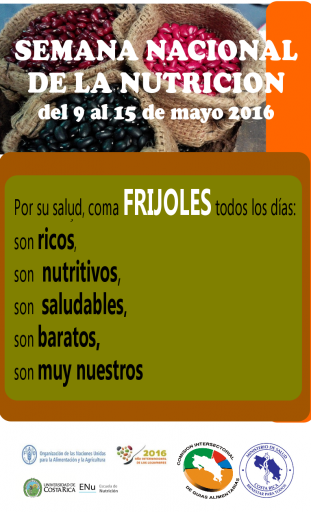World Milk Day 2024 Report – Celebrating Dairy’s Vital Role in Nutrition and Sustainability
This year, on June 1, we celebrated the vital role that dairy plays in delivering…
 Since the United Nations started to declare International Years in 1960, only 3 foods have received such recognition: rice, potatoes and quinoa. 2015 was dedicated to soils, 2014 to the importance of Family Farming… This year pulses entered this honorary list of UN International Years, ready to show the world how much they contribute to the global food security, to people’s diets and to the soils.
Since the United Nations started to declare International Years in 1960, only 3 foods have received such recognition: rice, potatoes and quinoa. 2015 was dedicated to soils, 2014 to the importance of Family Farming… This year pulses entered this honorary list of UN International Years, ready to show the world how much they contribute to the global food security, to people’s diets and to the soils.
As a Mexican, pulses and especially beans, are close to my heart since childhood. I was a difficult child who did not want to eat veggies. Can you guess what I preferred to eat instead? Beans. Frijoles de la olla with scrambled eggs. My niece’s favorite food is also beans… No wonder why we are called Frijoleros.
To track down what is happening in Latin America, this month I attended a couple of events dedicated to the International Year of Pulses 2016. Organised by INTA (Instituto Nacional de Innovación y Transferencia en Tecnología Agropecuaria), the LXI PCCMCA annual meeting took place in San Jose on April 5-8. The meeting gathered 300 attendants from many countries from the region including Panama, Nicaragua, Honduras, Guatemala, El Salvador, Cuba, Puerto Rico, Dominican Republic and Mexico, to discuss regional strategies for food security, mitigation and adaptation to climate change.
The conference celebrated IYP2016 with a special event that had speakers from important organizations such as Daniel Debouck from CIAT, Timothy Porch from USDA, and Rosemary Castro, from FAO in Costa Rica. Pulses are one of the most important sources of protein in Latin America and the Caribbean, especially beans. Whether it is Moros con cristianos, gallo pinto, frijoles charros or frijoles parados, beans have always been a staple food in the region, providing not only nutrition but economic stability to farmers. One thing I learned from the event is that sadly, the consumption of beans in Costa Rica is decreasing, from almost 60 gr per day in 1996, to 28 gr per day in 2007. That is about 2-3 tablespoons per day.
After the event, the Ministry of Health in Costa Rica announced that the annual initiative called “Week of Health” will be dedicated to the International Year of Pulses (IYP2016) this year. Many activities will take place from May 9-15 in the country to raise awareness on the benefits of beans, lentils, chickpeas and dry peas. We need other events like this in Latin America. We need more support from Governments. Farmers need it, as well as the population who is suffering from either overweight, obesity or malnutrition.
A couple of weeks later, I had the pleasure to talk about IYP 2016 in beautiful Antigua, Guatemala at a seminar of food innovation organized by the U.S. Dry Bean Council (USDBC). Attended by 75 representatives from the bakery and the food industry from Latin America, the seminar focused on how to use pulses in the formulation of new products. Experts explained how breads, chips, pasta, breakfast cereals, jams and many other products with beans as main ingredients are now available in the market. As the experts explained the product innovations, I focused on how to promote IYP 2016. There are many tools and channels, but perhaps the easiest way to start is to talk about it… “Have you heard that this is the International Year of Pulses?” Forget about the weather, there are more original ways to make small talk!
Follow me on Twitter @LaPausCeballos